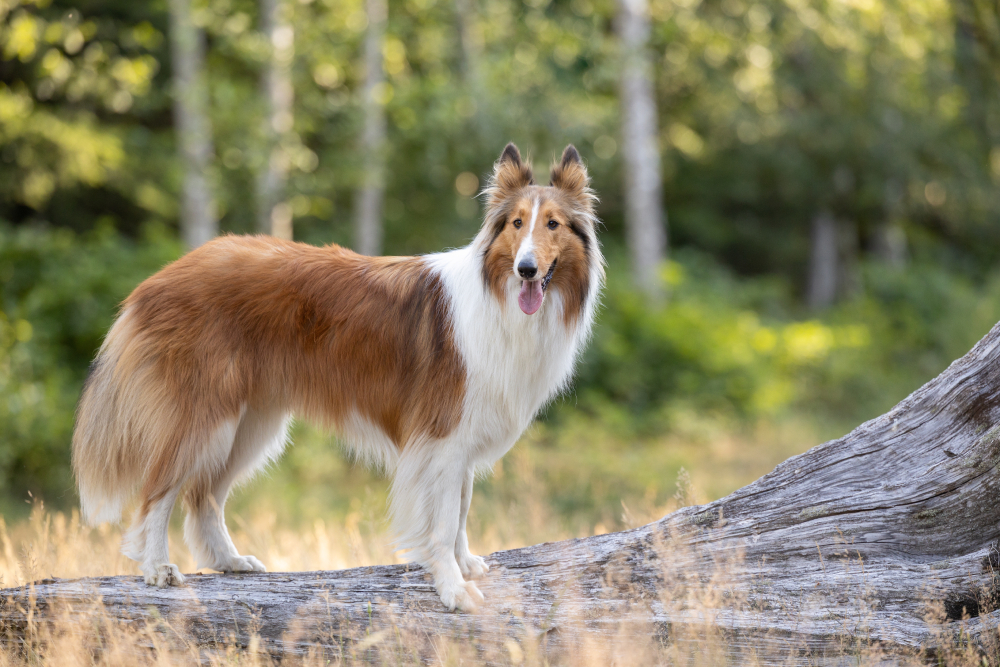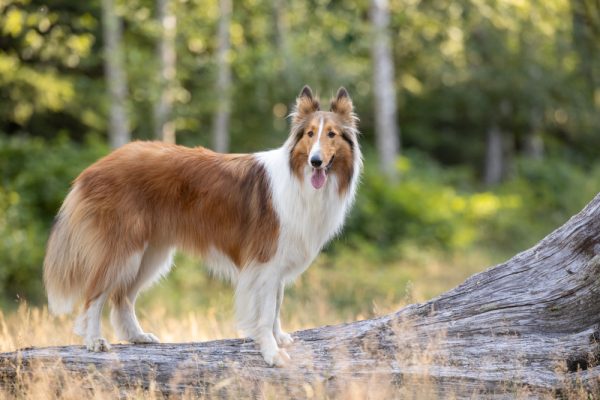Click Below to Skip Ahead
Collies are herding dogs that come from Scotland and Northern England. They’re medium-sized dogs, with a distinctive pointed snout and white band around their shoulders. Like many herding dogs, they are exceptionally intelligent and hardworking.
There are two main types of Collies differentiated by their coat type: Rough Collies and Smooth Collies. Rough Collies have very thick, long fur. Smooth Collies have a much shorter coat that’s smooth, hence their name. Both types come in similar colors and have about the same temperament.
Breed Overview
Height:
22–26 inches
Weight:
40–75 pounds
Lifespan:
10–14 years
Colors:
Sable and white, merle, tricolor, and more
Suitable for:
Sable and white, merle, tricolor, and more
Temperament:
Friendly, active, loyal
Originally, these dogs were bred to herd sheep, cattle, and other livestock. Therefore, they’re very agile dogs with strong herding instincts. In many parts of the world, they’re still used as working dogs. However, they can also be very popular family pets.
Collies are often great with children and other pets. Plus, they’re very trainable, so teaching them how to behave indoors isn’t all that challenging.
However, they can also be very energetic and need tons of exercise. We don’t typically recommend them for more inactive families unless you happen to live on a large farm. Keep reading to find out if this breed is a fit for you.
Collie Characteristics
Collie Puppies
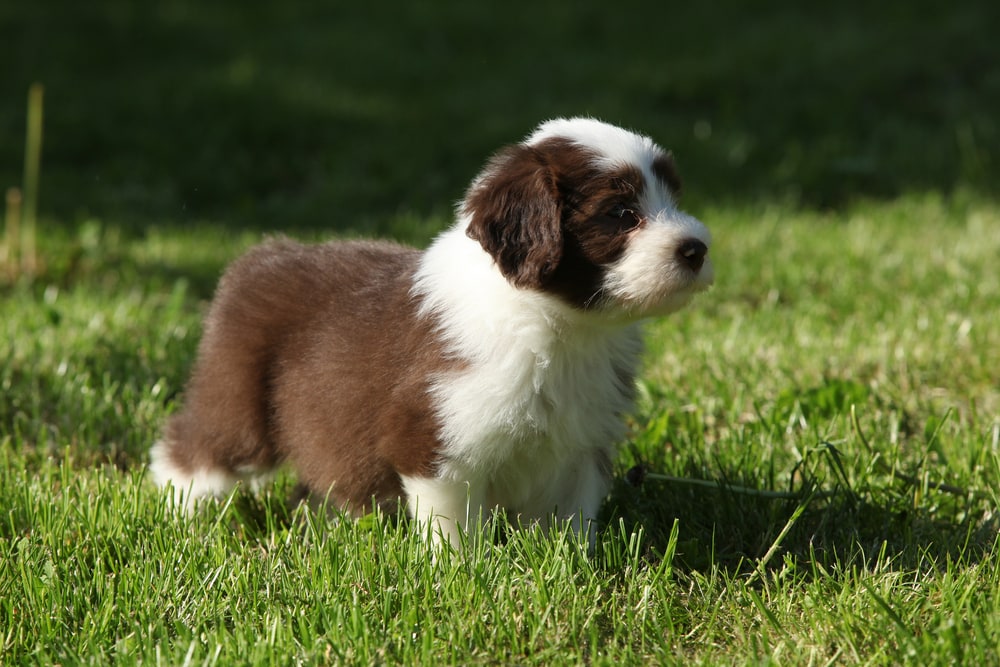
Just like adults, Collie puppies are adorable balls of fluff. They have boundless energy, tending to spend much of their time playing (or sleeping). They’re curious, like most puppies, and now is a good time to start socializing them. Because they’re herding dogs, they can be a bit nippy, so plan on training this behavior out early. Consistent training and socialization are vital, even though these puppies tend to be well-behaved. Take advantage of their intelligence by starting training early.
You can find plenty of Collies available from breeders across the world. However, these dogs can also show up at rescues and animal shelters, though this isn’t very common. Finding a puppy at a rescue can be almost impossible, though. Most dogs are adults when they arrive at shelters.
Collie Origin & History
We don’t know exactly when or how the Collie originated. They developed in Scotland and Northern England centuries ago as herding dogs. Their name even comes from the Scottish sheep (Colleys) they often watched.
For a long time, these dogs were strictly working dogs and didn’t have a set standard. In fact, it wasn’t until the 1860s that this breed started getting recognized as a breed.
Queen Victoria is often said to have brought the breed to the public after she brought a Collie back to England. This royal interest sparked others’ interest, which led to many new breeders popping up.
Temperament & Intelligence of the Collie
Collies are renowned for their intelligence. They are some of the brightest canine companions. Their eagerness to please and quick grasp of commands. Teaching them is often very easy. They can excel in agility and obedience, as well as herding trials.
Their intelligence also extends beyond obedience training. They can also figure things out with ease, thinking independently to solve problems. This trait can be great for working dogs, but it can also create unwanted behaviors.
Collies often form strong bonds with their families, and they tend to become very devoted very quickly. They’re gentle with children and other pets, assuming they’re properly socialized. However, they’re also very energetic. They require plenty of physical exercise and mental stimulation each day. Otherwise, they can become bored.
While they’re very friendly to their family, they can be reserved with strangers. Early socialization is crucial to prevent shyness and anxiety. These dogs aren’t often aggressive, but they can become anxious.
Are These Dogs Good for Families? 👪
Collies are becoming increasingly popular companion dogs. They’re great for some families, but that doesn’t mean they’re a good choice for everyone. They’re exceptionally gentle and patient, making them great companions for children. They’re often very tolerant of playtime antics and younger children, though we still recommend supervision. Many people love that they’re loyal, too.
Their intelligence makes them easier to train, which is important for teaching them how to behave. However, it also means that they can become bored more easily, leading to destructive behaviors. Without the proper mental stimulation, these dogs can quickly become troublesome to live with.
Collies do best in homes with yards. However, they can live in apartments with frequent walks. If you’re active and want a dog, you can take it with you on outdoor strolls; Collies can be great companions. Because they’re active, these dogs do best in an active family.
Because of their herding instincts, these dogs may herd children. Often, this involves nipping, which can be scary for kids. However, these instincts can often be trained and redirected. Teaching kids how to react properly by standing still and not running is also important.
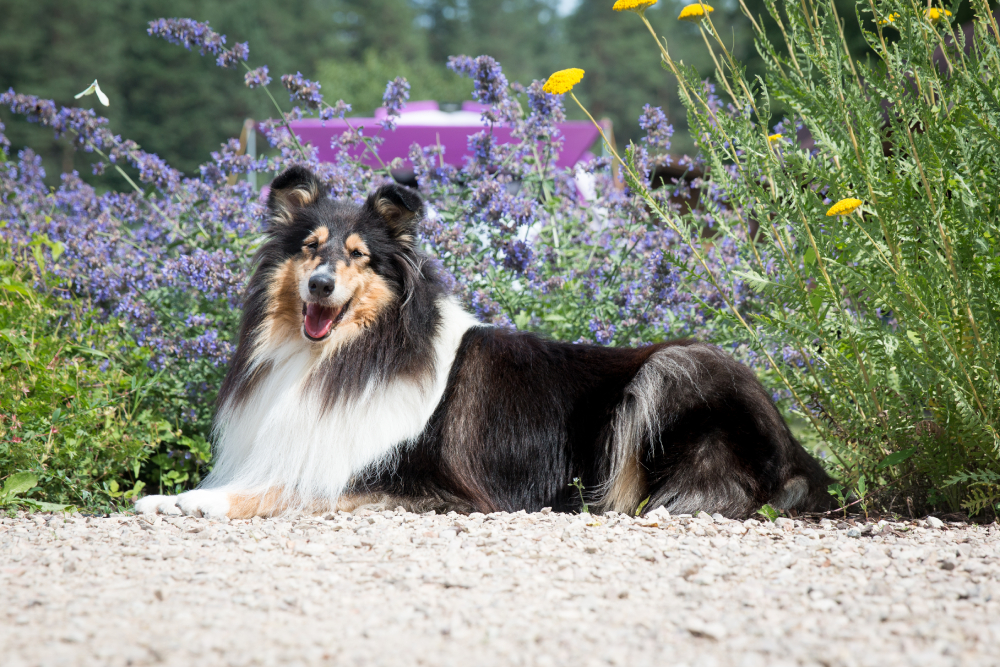
Does This Breed Get Along with Other Pets?
Collies often get along with other pets when properly socialized. They can even live with cats, though they may sometimes try to herd them. Training and socialization help with this, though. Many people live just fine with Collies and cats in their homes.
These dogs are energetic, so they often do best with energetic pets. They can become annoying for older, less-active dogs, though. Keep this in mind when deciding which pets to adopt.
Introductions are important, of course. Your Collie may not get along with any dog unless introduced properly. When adopting a new dog, ensure that you have a slow introduction plan that sets everyone involved up for success.

Things to Know When Owning a Collie:
Food & Diet Requirements 🦴
Collies are very energetic dogs. Therefore, they may need a high-calorie food designed for athletic dogs. High-quality protein is important to help maintain muscle mass, which is crucial for active dogs. Of course, healthy fats and carbohydrates are also important.
Even though these dogs are active, be careful not to overfeed. They tend to be very food-driven, leading to overeating and obesity. Measure all the food your dog eats and be careful with the treats!
Puppies require different nutrition than adults, so be sure to feed your younger dog a puppy formula. Otherwise, they may not get all the nutrients they need to grow properly, potentially leading to health problems later down the road. You don’t necessarily need to switch to a senior dog food at any specific point, though. It depends largely on how your dog is aging.
Adjust your dog’s food according to their activity level, too. Working dogs will need different nutrition than moderately active companion animals. If your Collie is only getting the minimum amount of exercise, they’ll probably need the minimum number of calories, too.
Because this varies so much from dog to dog, the easiest way to determine how much food your dog needs is to watch their body condition. You should be able to feel but not see your dog’s ribs. If they become too overweight or too skinny, adjust their food accordingly. Your vet can help you adjust your dog’s food as necessary, too.
Exercise 🐕
Collies are a working breed, so they need lots of exercise. You should plan for a minimum of 2 hours a day of exercise. Most Collies do best on even more exercise, up to 3 hours a day (or even more). These dogs are very active.
This exercise needs to be more than a leisurely stroll, too. Brisk walks, jogging, and even running are necessary for these dogs to meet their energy needs. Frisbee and agility training can be a great option, as they wear your dog out without wearing you out.
You’ll also need to keep your dog’s mind exercised. Daily training sessions can help with this, especially when spread throughout the day. Active games, like incorporating commands into agility courses, can also help wear your dog’s mind out. Interactive toys are a good option for when you’re away, but we don’t recommend relying on them exclusively.
Puppies and seniors will have different exercise needs than adult dogs. Puppies are still growing, and their joints can be delicate. Therefore, we recommend avoiding intense activity. Senior dogs often start slowing down at some point, but you should encourage as much activity as they can tolerate.
Always pay attention to your dog’s cues. Some dogs are more or less active than others. If your dog is panting excessively or lagging behind, you’ll need to adjust their exercise routine.
Training 🎾
Collies are very intelligent, trainable dogs. You still have to train them, though, and this can require a significant time investment each day. Start training sessions early to get your dog used to obedience. Keep each session short, aiming for no more than 5 minutes at a time for a puppy. Adults can often work up to 10 minutes maximum.
Socialize your dog from an early age, too. Collies are friendly, but they can be aloof with strangers. Introducing them to many kinds of people and animals at a young age can prevent potential anxiety. They’ll learn that strangers are normal and don’t mean them any harm.
Be consistent with house rules and commands. Get everyone in your house on the same page. Not only does consistency prevent your dog from finding loopholes (which Collies are very good at), but it can also prevent anxiety in these somewhat uptight dogs. While Collies are trainable, it’s important to be patient. Training takes time, even when your dog is on the more intelligent end of the spectrum.
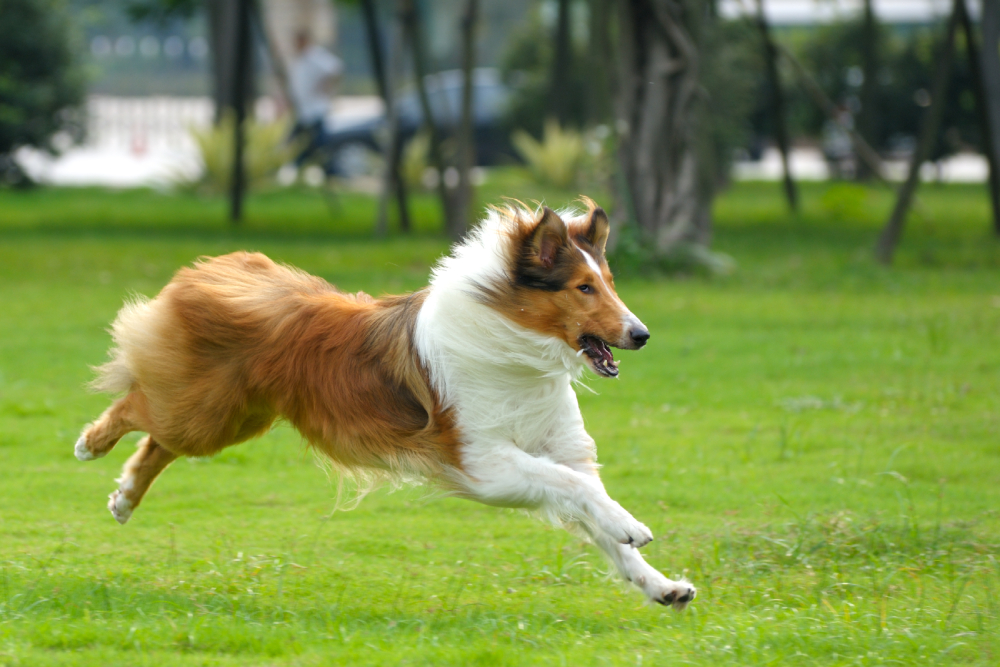
Grooming ✂️
A Collie’s grooming needs depend almost solely on the type of Collie it is. Rough Collies and Smooth Collies have such different grooming needs that it’s almost impossible to compare the two.
Rough Collies need a lot of brushing. They require daily brushing, preferably, to prevent mats and tangles. If you miss a day, you’ll really be kicking yourself for it the next day. That’s how fast their coats can get out of hand. You’ll probably need a slicker brush and a pin brush. Smooth Collies don’t need nearly as much brushing. However, we still recommend brushing them at least a few times a week. A firm bristle brush works best, as it can remove dead hair and dust effectively.
Neither Collie needs much bathing. Once every 3 months is fine, or whenever they roll in mud. Some dogs tend to get dirtier than others, depending on how much work they’re doing. Trimming isn’t necessary for either dog. You should not trim a rough Collie, as this can interfere with their coat’s ability to regulate their body temperature. You can trim around their paws and face, though (which we recommend for hygienic purposes).
We recommend that you groom your Collie as soon as you bring them home, even if they don’t need much grooming as a puppy. Getting them used to the grooming process can help later when they’re bigger.
Always check their ears for signs of infection. While this isn’t common for Collies, ear infections are very easy to overlook in dogs. You may need to clean out your Collie’s ears, too. Use a wet cloth, and never shove anything into your dog’s ears. Just like people, this can cause hearing damage!
You’ll also need to regularly trim your dog’s nails. If your dog works, you may not need to trim their nails as often, as they will naturally wear down. Otherwise, though, plan to trim their nails at least once a month.
Health and Conditions 🏥
Collies are pretty healthy dogs. However, like any breed, they are prone to some hereditary health conditions.
One of these is Collie eye anomaly, which is an inherited condition. It affects the development of the eye, potentially causing blindness. Genetic testing can help prevent it, and this condition is one of the reasons we recommend a quality breeder.
Collies often possess the MDR1 gene, which affects how they respond to certain medications. If your Collie has this gene, their medication may need to be adjusted in some cases. This condition isn’t deadly, but a genetic test to see if your dog has it is important. Like many dogs, Collies can also inherit progressive retinal atrophy. This condition causes the retina in your dog’s eyes to degrade over time, leading to blindness.
Collies can also develop hip dysplasia, though not at the same rate as other breeds. This condition occurs when the hip doesn’t develop properly, leading to wear at an early age. The dog usually shows arthritis-like symptoms by the time they’re three. Luckily, medication is enough for most Collies, though surgery may be required in severe cases.
- MDR1
- Hip dysplasia
- Collie eye anomaly
- Progressive retinal atrophy
Male vs. Female
Males are almost always bigger than females. Male Collies usually weigh between 31 and 44 pounds, while females weigh under 42. Of course, each gender also has breeding differences. If not spayed or neutered, these differences will be apparent in the dog’s personality. For instance, males won’t go into heat, while females will. Often, this leads to temperament changes as a dog’s hormones fluctuate.
Other temperament differences may occur, too. However, temperament differences are much less set in stone than physical differences.
3 Little-Known Facts About the Collie
1. They have a very good sense of smell.
While they aren’t hounds, Collies have a surprisingly strong sense of smell. They’re often utilized as search and rescue dogs and even in narcotics detection.
2. Collies almost had a different name!
In the beginning, Collies were called “Colley Sheepdog” due to how often they herded Colley sheep. This got shortened to “Collie,” which stuck around.
3. Not all Rough Collies have long coats.
Most Rough Collies have long coats, which sets them apart from Smooth Collies. Confusingly enough, though, there is also a variant of the Rough Collies called the short-haired rough Collie. As you might guess, this variant has short hair. However, their fur is thicker than a Smooth Collie.
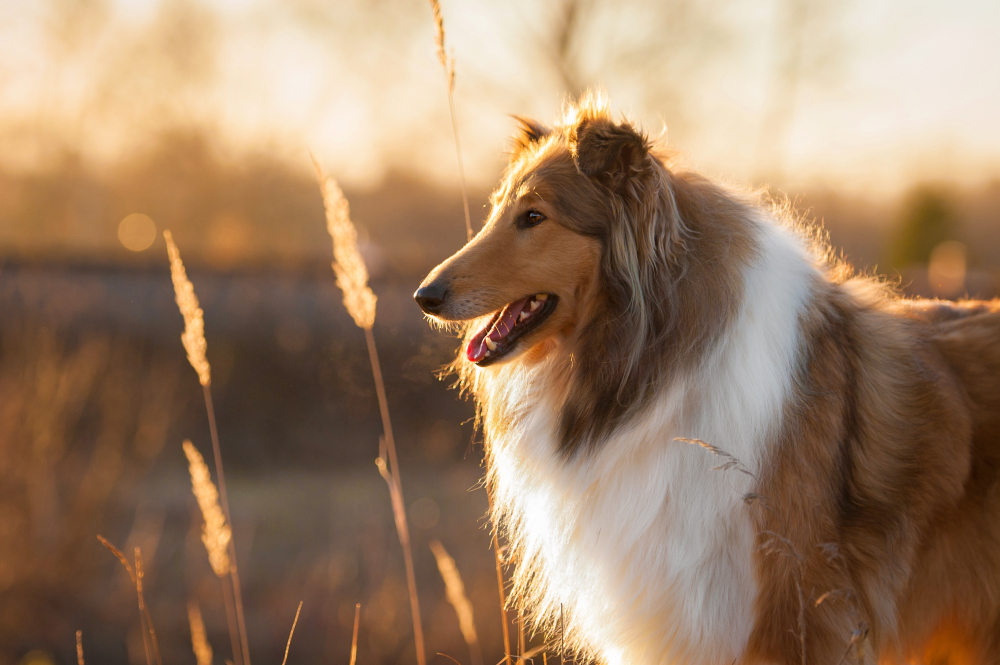

Final Thoughts
Collies can be great companion dogs for the right family. They are exceptionally active, so they do best in an active family with a yard. They also get along great with children thanks to their patience and gentle nature. Having a pack of children to run around with is this dog’s dream.
However, it’s important that the whole family is dedicated to their Collie’s exercise and training. These dogs can be a lot of work, but it’s often much easier to care for them when this work is spread across several family members.
Featured Image Credit: Sharon Snider, Shutterstock

